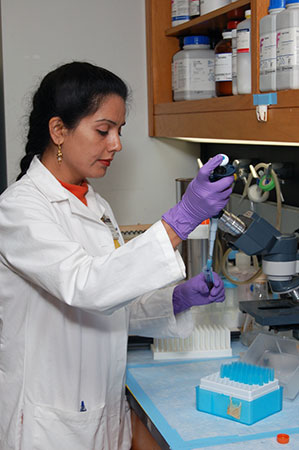 Nita Limdi, Ph.D., Pharm.D., professor of NeurologyA quick, precise genetic test can significantly reduce the risk of cardiovascular events by helping to identify more effective medication for some heart patients, according to new findings presented Nov. 15 at the American Heart Association’s Scientific Sessions in New Orleans. Investigators from the University of Alabama at Birmingham collaborated on the multisite study, which was led by researchers at the University of Florida.
Nita Limdi, Ph.D., Pharm.D., professor of NeurologyA quick, precise genetic test can significantly reduce the risk of cardiovascular events by helping to identify more effective medication for some heart patients, according to new findings presented Nov. 15 at the American Heart Association’s Scientific Sessions in New Orleans. Investigators from the University of Alabama at Birmingham collaborated on the multisite study, which was led by researchers at the University of Florida.
Each year, more than 1 million coronary stents are placed in patients with heart disease. After the stent is put in place, patients are prescribed a combination of two anti-platelet medications to reduce the risk of heart attacks or strokes. The most commonly used combination is aspirin and clopidogrel, or Plavix. However, about 25-30 percent of patients have a gene variant that limits or prevents their body’s ability to activate clopidogrel, putting them at a higher risk for major adverse cardiovascular events.
In the new study, UAB investigators joined researchers from seven other institutions to combine data from 1,815 patients. All patients received genetic testing at the time of their stent placement and were followed for one year after the stent procedure.
Thirty percent of patients carried the gene variant that limits or prevents their body’s ability to activate clopidogrel. Based on that genotype, 60 percent of these patients were prescribed alternative anti-platelet medication, which reduced the number of deaths, heart attacks or strokes by nearly half compared with those who continued taking clopidogrel.
“This is the first large U.S.-based collaborative study assessing the implementation of a genetic test in the provision of personalized cardiovascular medicine,” said Nita Limdi, Pharm.D., Ph.D., professor in the UAB Department of Neurology and interim director of the UAB Hugh Kaul Personalized Medicine Institute. “Personalized medicine is about using an individual patient’s information, including genetic data, to tailor treatment.”
“In addition to the current implementation study, research from ongoing clinical trials may help provide additional evidence on effectiveness of genotype-guided therapy,” said Brigitta Brott, M.D., professor in the Division of Cardiovascular Disease in the Department of Medicine.
In addition to identifying the optimal anti-platelet therapy for stent patients, the genetic testing can be done efficiently. Overall, across the nine sites, genetic information was available in about one day. At UAB, the molecular diagnostic laboratory led by Shuko Harada, M.D., associate professor in the Department of Pathology, provided genotype results in 70 minutes, allowing physicians to make changes to the prescriptions immediately.
“This study demonstrates the power and the promise of genotype-guided therapy in delivery of personalized medicine,” said Limdi. “Genetic testing can be done in real time, guidance on tailoring treatment can be incorporated into the clinical care, and that patient outcomes can be tracked to assess whether genotype-guided therapy improves patient outcomes. Evidence from such studies will collectively inform broader implementation of personalized medicine.”
| "Genetic testing can be done in real time, guidance on tailoring treatment can be incorporated into the clinical care, and that patient outcomes can be tracked to assess whether genotype-guided therapy improves patient outcomes. Evidence from such studies will collectively inform broader implementation of personalized medicine.” |
The study was conducted through a collaborative genomic medicine network funded by the National Institutes of Health and known as Implementing Genomics in Practice, or IGNITE. Collaborating sites are the University of Florida, Vanderbilt University Medical Center, University of Alabama at Birmingham, University of North Carolina, the University of Maryland-Baltimore, the University of Pittsburgh, the University of Illinois-Chicago, Indiana University-Indianapolis, Sanford Health, Duke University and the University of Pennsylvania.
UAB efforts are supported in part by UAB’s Health Service Foundations’ General Endowment Fund, Hugh Kaul Personalized Medicine Institute, and a grant from the National Heart, Lung, and Blood Institute.